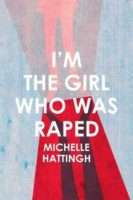The Clinical Psychology syllabus of our honours degree was taught by Professor Daniels. Her speciality is Gender Psychology. Professor Daniels is skinny, wears loose-fitting grey skirt suits, and when she moves, single strands of hair jump up and dance around her head. Her voice is firm and her eyes bright.
One day, in that hot, airless room, she asked us what the predominant emotion in rape victims is. It was about half way through the year. We’d learned an immense amount, but were still shy of realising we knew nothing. So we guessed.
“Depression?”
“No.”
“Loneliness?”
“No.”
“Guilt”
“No.”
And on and on…
Finally, Professor Daniels rests her hands on her desk and says one word: “Shame.”
For all my studying, for all my academic knowledge, I was just like any other rape victim. I felt dirty on the inside – stained in a way that can’t wash out. A voice in my head shouted over and over again, “No one will ever love you” until it was my truth. I was drenched in shame. It consumed me, and sat on my chest, not allowing me to breathe.
Why was I ashamed? Because of the way we were raised to think about rape. We whisper rape like it’s a dirty word and think rape is when a strange man comes into your bedroom at night and grabs you. We think rape is always violent. We think that rapists are psychopaths, and that it’s up to us to follow very specific steps to avoid getting raped.
These rape myths are so deeply embedded in our daily lives that it’s only in recent years that they’ve been challenged, like in late 2014 when Columbia student Emma Sulkowicz carried a mattress around with her on the college campus to protest sexual assault. Emma says she was raped by a fellow student and the mattress symbolised how badly the school dealt with her complaint. Or the #EverydaySexism hashtag on social media where women give voice to their daily, lived experiences of sexism. It’s only recently that we started challenging the patriarchy like this – for most of history, and for a large part of society still, rape myths are ingrained in the way of thinking.
For the nurse at the hospital, for the detective, and for many of the people who knew about my rape, rape myths allowed them to make sense of what happened to me. The logic is clear: I was raped because I was at a party, we were drinking, and my friend and I chose to go to the beach by ourselves.
The thing is though, when someone thinks this way, they’re basically giving men permission to rape by refusing to hold them responsible for their sexually violent behaviour. And that’s not okay.
I chose to do my thesis on rape and I never once doubted that my subject was meaningful, important, and 100% the right choice for me. What drew me to the subject of rape in the first place was the fact that it’s surrounded by all of these lies that people believe about it. I wanted to argue with the myths and I spent a whole year doing just that.
But I was a much better feminist before I was raped. Before I was raped, I could see lies for what they were – lies. After I was raped, I started to buy into these lies. I felt like I did something wrong. I knew it was my fault that I was raped. I am dirty, impure. Defiled. And knowing the theory changed fuck all.
The nurse is back: “You know what the world is like.” Hours after I give a lecture on victim blaming, the nurse was blaming me.
And what do I do? I believed her. Maybe she was telling me the truth that my friends and family are too kind to tell me.
Mere hours after I tried to kick a rape-supporting culture in the balls, I am down on my face being kicked and kicked and kicked. Stupid, stupid, stupid: what were you thinking Michelle? Thought you could win?
And I can’t get up. I can’t stand. I don’t believe in God – he never showed up. I don’t believe the academic theories that I had spent hours and hours studying.
I believed the nurse. Because if it wasn’t my fault, why the fuck did I feel so ashamed?

